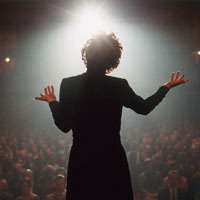 Born into poverty in the back streets of Paris in 1915, Edith Piaf lived a life much like the songs for which she was famous – full of tragedy and triumph. Abandoned by her mother at an early age, Piaf spent some of her early years with her paternal grandmother, while her father was fighting in the war. Her grandmother ran a brothel, and the prostitutes nursed Piaf through numerous illnesses, including one that blinded her. The young Edith believed that a pilgrimage to the statue of Saint Therese cured her blindness, and this cemented her deep faith for life. When her father returned from the war he resumed his profession as a circus performer, but it was not long before the two were on the streets, begging for their survival. The turning point is when the young Edith is forced to sing for money being thrown into a hat.
Born into poverty in the back streets of Paris in 1915, Edith Piaf lived a life much like the songs for which she was famous – full of tragedy and triumph. Abandoned by her mother at an early age, Piaf spent some of her early years with her paternal grandmother, while her father was fighting in the war. Her grandmother ran a brothel, and the prostitutes nursed Piaf through numerous illnesses, including one that blinded her. The young Edith believed that a pilgrimage to the statue of Saint Therese cured her blindness, and this cemented her deep faith for life. When her father returned from the war he resumed his profession as a circus performer, but it was not long before the two were on the streets, begging for their survival. The turning point is when the young Edith is forced to sing for money being thrown into a hat.
Two hours is not nearly enough time to recreate all that Piaf managed to jam into her short life (she died at the age of 48). While I was actually a bit confused by the film flashing back to different times in Piaf’s life, the film does reveal a life crammed with experiences. Marlene Dietrich referred to Piaf as a fragile bird and, worried that her frail friend was burning the candle at both ends, she gave her the gold cross that Piaf would wear as a talisman. Olivier Dahan’s film captures Piaf’s passion, as Marion Cotillard becomes the tiny woman in the simple black dress. The song La Vie En Rose (My Rosy Life) was actually penned by Piaf and shows her ability to maintain a positive outlook even though so much of her life was torturous. Her darkest times produced her finest songs, and in the end, France’s most memorable cultural icon regretted nothing.
There’s a special cabaret opening for La Vie En Rose at the Windsor Cinema on July 6 from 6pm which features Perth based Piaf interpreter Pascale, canapés and champers followed by a preview screening. Tickets available through the Windsor or online at www.luna.com.au.
La Vie En Rose (M) – Directed by Olivier Dahan





